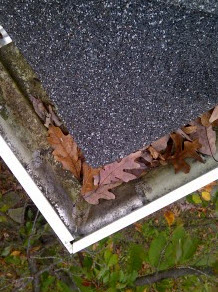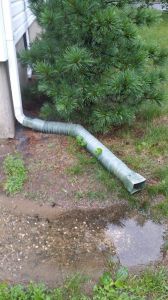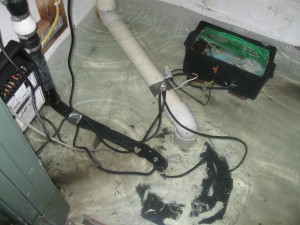Ever since Hurricane Sandy, everyone seems to know the drill when a big storm is approaching.
The usual activities like stocking up on a 3-day supply of water and non-perishable food,
stockpiling flashlights and fresh batteries
and a battery powered radio,
planning an evacuation route over high ground ahead of time,
and planning to use text messaging to communicate with family and friends during the storm
are commonplace now.
But for homeowners and business owners, there are some additional things you can do right now to prevent storm water damage to your home or commercial property.
So here are 6 Tips to Prevent Storm Water Damage to your home or business:

1. Take a look at your Landscaping.
Keep landscaping materials trimmed away from the roof at least 6 feet or more to prevent shingle damage from rubbing branches.
Clearing your yard of objects that could become airborne in high winds can prevent damage to windows.
2. Take a look at your Gutters.
A gutter system is supposed to channel water away from the roof and deposit it to a more friendly location.
But clogged gutters on the upper floors can cause water to back-flow into the home, almost guaranteeing water damage will happen.
In addition, make sure you have gutter extenders on the ground floor to make sure the water drains well away from your home to prevent basement flooding. By keeping gutters cleaned and well maintained you can prevent costly repairs from storm water damage.
3. While you’re up on the roof checking your gutters, check the Sealants
Nothing causes more water damage from storms than leaking sealants. Check all roofing penetrations such as stacks, skylights and chimneys for decaying sealants and make the repairs as needed. But it’s not just the roof that can leak from bad seals. Your windows, doors and siding can leak when aging sealants are in place. Apply caulk, tar, or silicone to prevent storm water from leaking into your home.

4. Take a look at your Attic Ventilation
This may seem like an odd way to prevent storm damages. But attic ventilation is crucial to preventing some forms of storm damages. During the winter months when snow and ice accumulate on your roof, ice dams can form when hot attic air can’t properly ventilate through the top of the roof. Not only can an ice dam be dangerous from falling icicles, it can also cause water to infiltrate through your shingles, no matter what their condition. Have a licensed and insured roofer check to ensure your attic ventilation is in working order before the storm season comes.
5. Utilities
No one wants their power, cable, telephone or water to go out during a storm, but you can be better prepared against utility interruptions if you ensure that the lines connecting your home to the grid are free and clear from any and all trees or shrubs that could topple over in heavy snow or high winds.
But heavy storms usually mean power outages . . . . Have a generator? Does your generator work and do you have enough fuel for it? Time to check that now . . .
And while we’re on the topic of utilities, consider using Surge Protectors: UL-Listed surge arrestors should be installed on all electrical service panels. Surge Protectors help protect your home electrical system, appliances and sensitive electronic equipment from the effects of lightening. Every power connection coming into your home should be protected including phone, satellite, cable and power lines. While power strips protect very little against electrical power surges, surge protectors that are installed correctly can not only protect your appliances and electronics but also help prevent electrical fires. But, if you don’t have time to get and install surge protectors . . .
UnPlug it: The easiest, and often most overlooked, way to prevent damage to your appliances and electronics is to unplug everything if you know that a storm is approaching. Disabling the connection to your electrical system is a sure way to prevent power surge damage.

6. Sump pumps prevent flooded basements . . . but only when they work!
When was the last time you checked your sump pump? Go check it now, raise the float, and make sure it runs! Does the sump pump battery backup work? If you have a battery back-up, check it. If you don’t, call your plumber today and get a backup!
